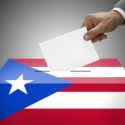Millions of Americans went out yesterday to vote. 36 million voted early, and Tuesday’s voters completed a record turnout for midterm elections.
Puerto Rico didn’t have the opportunity to vote for legislators yesterday. They don’t have any voting members in Congress, because Puerto Rico is a territory and not a state.
Puerto Rico has officially requested statehood and there is a statehood act in Congress right now. Congress will vote on this act (or another one) and make the decision about whether Puerto Rico will become a state.
That means that people living in the the states, not people in Puerto Rico, voted for the men and women whose votes will decide whether Puerto Rico will become a state.
Voting for other people
Voters in Kentucky and Idaho made the decision to vote for people who will end up voting yes or no on statehood for Puerto Rico. It’s a strange idea, but it’s nothing new.
In 1776, only landowners were allowed to vote. There were no rules about male or female voters, black or white voters, young or old voters — if you owned land, you had the vote.
In practical terms, landowners were usually white men over the age of 21, but all landowners made the big decisions about government. They were making choices for the majority of Americans, who did not own land.
In 1787, states made the decision on who could vote. There was no federal law about voting, but most states stuck with the rule that people who owned land were the only ones who could vote. Over the next century, there was plenty of discussion about whether women should be allowed to vote. By 1856, every state allowed all free white men to vote.
When the United States elected George Washington, only 6% of the people could vote. A century later, many more people had the right to vote… but not everyone.
The 14th and 15th Amendments
The 14th and 15th amendments to the U.S. Constitution, in 1868 and 1870, say that race can’t be a reason not to allow citizenship or voting rights. However, it was decided in 1876 that Native Americans aren’t covered by the 14th amendment, and so did not have the right to vote.
Many more controversies and decisions affected the voting rights of Native Americans and Asians in the United States through the late 19th and early 20th centuries. Native Americans got the right to vote in 1947, and the limitations on Asians ended in 1952. There are many people living now who were alive then — it’s not that long ago.
Women got the vote in 1920.
In 1965, the Voting Rights Act was passed. In response to many limitations on voting based on ethnicity, this law makes it illegal to prevent people from voting. It followed a law passed in 1964 that made it illegal to charge people a tax to vote. Essentially, the century from the 15th amendment to the Voting Rights Act was filled with efforts to keep people from voting.
In 1971, 18 year olds got the vote.
In 2000, a Boston court confirmed that residents of Puerto Rico could not vote in presidential elections. Millions of U.S. citizens living in Puerto Rico cannot vote in these important races.
If you were able to vote in the 2018 elections, you had a chance to make sure that you voted for people who would support statehood for Puerto Rico.
Whether you had to chance to vote or not, you can tell your legislators that statehood matters to you. If it matters to you, it should matter to them.








No responses yet